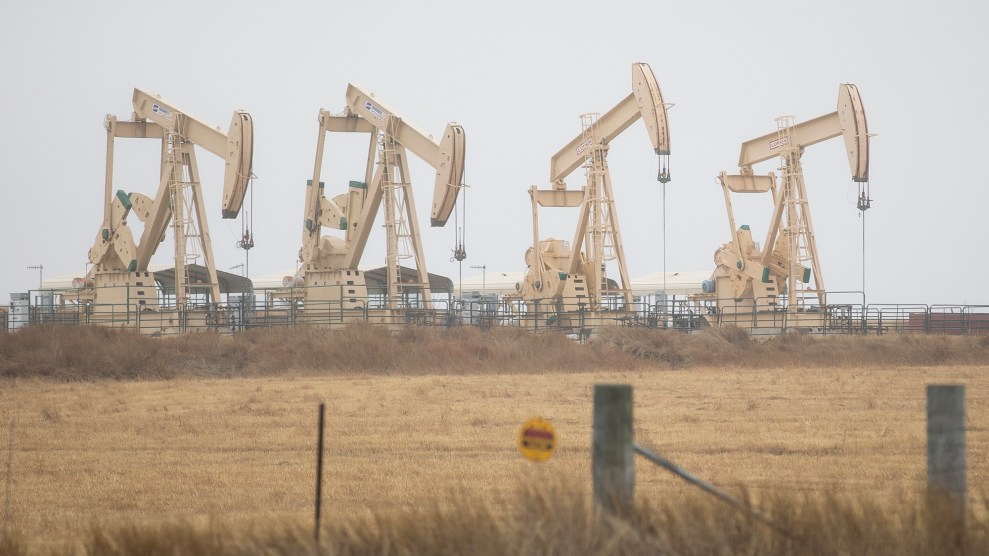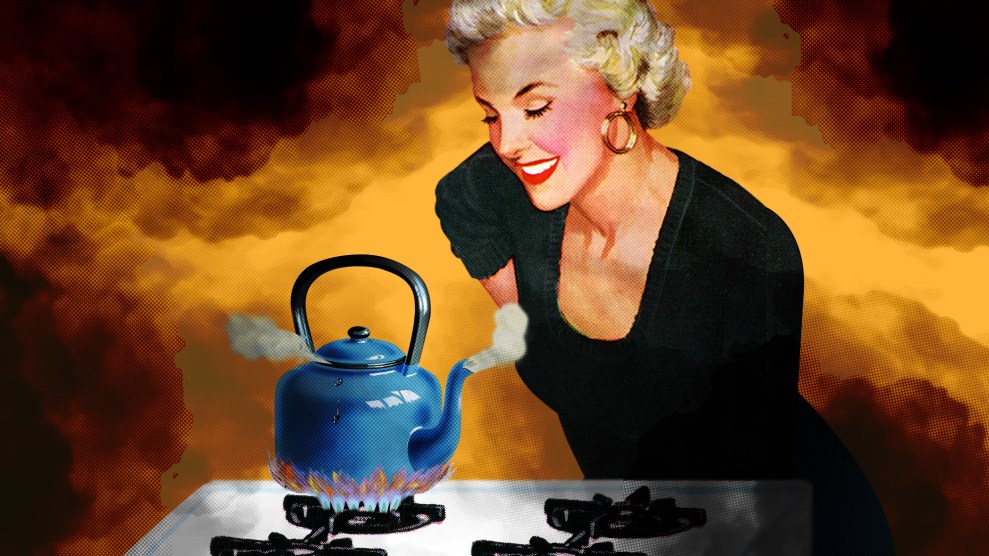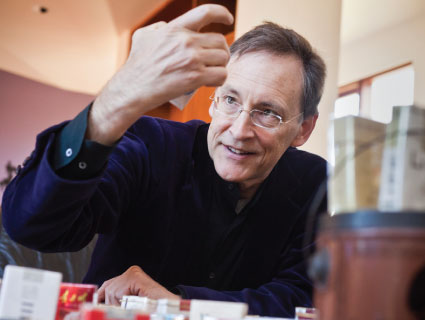
Oil derricks in Three Rivers, Texas.Nick Wagner/Xinhua via ZUMA Pres
This story was originally published by the Guardian and is reproduced here as part of the Climate Desk collaboration.
In the spring of 2019, Phil Goldberg, a lawyer and hired gun for a front organization serving some of America’s most powerful oil firms, spotted an opportunity to serve his masters.
The University of Hawaii was holding a conference about a wave of lawsuits against the oil industry, and Goldberg was alarmed the event failed to include representatives from the energy business. So the day before the symposium, he fired off an email to the university demanding that big oil be heard alongside its critics.
The event was to interrogate the oil industry’s decades-long cover-up involving the climate crisis. But a one-sided debate, Goldberg wrote, “does students and the general public a significant disservice.” He insisted the meeting be postponed.
Denise Antolini, associate dean at the university’s law school who organized the conference, said in her 23-year-career as a law professor, she had never received such demands. “Your request to disrupt our public event was quite surprising, especially coming from far across the continent, from someone I’ve never heard of, on behalf of a private client with an apparently direct financial interest in chilling debate about climate litigation,” she replied.
The conference went ahead, but Goldberg chalked up his intervention as a win. He had managed to pressure Antolini into reciting his objections to the conference in her opening statement. He also convinced the university to post his blogs on its website alongside a letter published by the Honolulu Star-Advertiser denouncing the meeting for daring to suggest there was a solid legal case against the oil companies.
Goldberg is part of a network of enablers working to preserve big oil’s power and reputation as it faces a barrage of litigation. More than two dozen cities, states and municipalities allege the industry lied to Americans for decades by downplaying and outright denying that fossil fuels caused climate change. The lawsuits demand companies use some of their vast profits to help pay for the human toll of the climate crisis, including the damage brought by rising seas and increasingly severe weather disasters.
Desperate to avoid costly settlements, the fossil fuel industry relies on front organizations to discredit the litigation and sway public opinion in its favor. So nearly three years ago, the friends of big oil turned to Goldberg, a former Democratic congressional aide and self-described “committed environmentalist,” to persuade Americans that the companies responsible for the growing climate disaster are now the ones to fix the problem.
Though Goldberg heads an ostensibly independent initiative called the Manufacturers Accountability Project, much of its funding comes from some of the biggest names in the oil business. MAP hired Goldberg to push back against litigation on the fossil fuel industry’s behalf, allowing oil companies to keep their hands clean in the process.
Goldberg is leading a charge in local media to discredit those suing the fossil fuel industry as a “fringe litigation movement” conspiracy of opportunistic politicians, environmental extremists, and money-grasping lawyers who pose a threat to the American way of life.
“There are two goals of this litigation—drive climate policy and wage a public relations campaign against the energy industry,” Goldberg told the Guardian. “It has no foundation legally and, more to the point, is not the right way to fight climate change.”
Karen Sokol, a law professor at Loyola University who specializes in climate litigation, likens the strategy to that pursued by the tobacco industry when it faced litigation over what it knew about cigarettes causing lung cancer. But, she said, the strategy may prove more successful for big oil.
“The fossil fuel industry has this ability to really take command of the societal narrative on a whole level that the tobacco industry just didn’t because, although we were definitely a cigarette culture for a time, not everybody was so dependent on cigarettes in the same way we are on fossil fuels,” she said.
Kert Davies, founder and director of Climate Investigations Center, is scathing about Goldberg’s part in that. “Phil Goldberg is a useful pawn on a much larger chessboard. If he doesn’t know that, it’s a shame,” Davies said. “If he does know his role, it’s worse.”
Outwardly, Goldberg seems an unusual bearer of the torch to snuff out climate lawsuits. The New Jersey-born lawyer characterizes himself as a “progressive, pro-environmentalist” with a long commitment to Democratic causes. With that, he has positioned himself as a voice of reason as he leads the fossil fuel industry’s campaign to distract Americans from the scene of the crime and embrace big oil as a necessity in the struggle to contain global heating.
But Goldberg is also a former coal lobbyist now working as an attorney for a Kansas City law firm—Shook, Hardy and Bacon—that made its name decades ago as the cigarette industry’s attack dog. The legal practice even gained public notoriety for inspiring the fictional law firm of Smoot, Hawking in the satirical book turned film, Thank You for Smoking.
Shook, Hardy pioneered a strategy toward avoiding corporate accountability—a denial strategy the oil companies followed not many years later. Starting in the mid-80s, the firm convinced cigarette companies to shut down research into the dangers of nicotine, warning it could be used against them in court. It also hired specialists with advanced scientific degrees to cast doubt on the evidence that smoking causes lung cancer. The firm’s lawyers soon developed a reputation for probing the lives of people who dared to sue the tobacco firms and for using court procedure to draw out cases until plaintiffs ran out of funds.
All of this so disgusted one federal judge, Gladys Kessler, that in a damning 2006 civil judgment against the cigarette makers she said Shook, Hardy and other firms played “an absolutely central role in the creation and perpetuation” of a 50-year campaign of deceit.
“They devised and coordinated both national and international strategy; they directed scientists as to what research they should and should not undertake; they vetted scientific research papers and reports as well as public relations materials to ensure that the interests of the (tobacco industry) would be protected,” she wrote. “What a sad and disquieting chapter in the history of an honorable and often courageous profession.”
The chapter cemented Shook, Hardy’s reputation for vigorously defending clients and drew other contentious industries to the firm. And since joining Shook, Hardy in 2003, Goldberg has lived up to its reputation for playing hardball.
Throughout his career, Goldberg has developed an expertise at combatting public accountability lawsuits on the behalf of many embattled corporate clients, including coal companies, the asbestos industry, and pharmaceutical companies accused of medical malpractice.
Simultaneously over the last two decades, he has led a wing of the Democratic think tank, the Progressive Policy Institute, that works to protect corporations from lawsuits and to keep regulatory changes in the hands of politicians who can be influenced by industry money and lobbyists. Goldberg has also advised the right-wing American Legislative Exchange Council on drafting laws to make it harder to sue big corporations.
Goldberg’s current defense of the fossil-fuel industry is equally focused. He deflects questions about Big Oil’s cover-up of its own scientific research on global heating by claiming that raking over the past is not going to help find solutions to the climate crisis. He also avoids answering questions about parallels with the tobacco industry’s actions.
Instead, Goldberg has sought to nurture a progressive image with claims to be dedicated to the climate fight but concerned that suing oil companies is getting in the way of solutions. He goes out of his way to say that he “cares deeply about climate change” and, in his answers, returns repeatedly to “the important work that needs to be done on the climate.”
This image was carried through to the Guardian‘s photographs for this article, which Goldberg agreed to pose for only while riding his bicycle. He declined to remove his helmet for any of the pictures.
Today, Goldberg is at the face of a PR campaign to squash climate litigation against Big Oil. He calls his strategy the “iron triangle defense.” One side of the triangle is dedicated toward shaping the public narrative, the second is for pressuring legislatures to write laws that discourage corporate accountability litigation, and the third side influences the judicial process with amicus briefs in cases that might have a bearing on those lawsuits.
A key part of the iron triangle strategy is that its beneficiaries should not be seen as the ones who are pulling the strings. Corporations fighting legal battles learned long ago that Americans are not particularly trustful of executives in suits. So major industries seek to influence public opinion and political action by funding front organizations to work on the behalf of corporate interests, but under a different name.
It was an obvious move for the fossil-fuel industry to turn toward front groups as it grew increasingly alarmed in recent years at a surge in lawsuits demanding compensation for damage caused by the climate crisis. Oil executives feared a repeat of the tobacco industry’s fate when public opinion turned sharply against the cigarette makers, forcing the largest civil settlement in US history.
Major oil firms, including Exxon, Shell and Chevron, looked to the National Association of Manufacturers, one of the US’s most powerful business lobby groups, with a long history of creating front organizations at the behest of various industries, to help “combat frivolous, politically motivated lawsuits against energy manufacturers.”
Four years ago, NAM launched a group, the Manufacturers Accountability Project, to take the campaign in defense of big oil on to the streets and into the local media. A year later, it recruited Goldberg to lead the initiative. While much of their strategy is an attempt to intimidate litigants through the legal process, Goldberg’s role is to take the fight to local communities in an attempt to mold public opinion—and potential jurors—before the cases come to court.
From local newspapers to NPR, Goldberg pushes arguments designed to deflect from the fossil fuel industry’s responsibility for the climate crisis. “Those of us who care deeply about climate change, our economy, and our way of life must focus our elected leaders on game-changing innovations, not these politically-driven litigations,” he wrote in the New Jersey Globe after three New Jersey senators pressed the state to sue Big Oil to pay up for the costs caused by their deceptions.
Goldberg has pursued similar lines after the attorneys general of Vermont and Connecticut filed cases against the oil industry. “We should be fighting climate change instead of each other,” he reasoned in the local press.
Sokol, the law professor and climate litigation specialist, said she saw Goldberg’s intervention tactics everywhere there is a lawsuit against the fossil fuel industry. “Say a new locality files a suit… Suddenly the local press is infiltrated with Goldberg quotes. He fires out op-eds,” she said. “It’s a concerted battle against this litigation, which in many ways is a testament to how powerful the industry suspects this could be if it’s allowed to have its day in court.”
Still, even in Goldberg’s home state, there are plenty who are not buying it. In 2020, three New Jersey state senators pressed the state to sue Big Oil to pay up for the past and present costs caused by their deceptions.
“Rather than alert the public and help usher in the transition to clean energy, big oil took a page out of big tobacco’s playbook and funded and led a decades-long campaign to lie, deceive, and confuse the public about the science of climate change,” two of the senators, one Democrat and one Republican, wrote in USA Today. “It’s only fair that these fossil fuel companies who got rich while igniting the climate crisis are made to pay their fair share of the costs to our communities.”

















